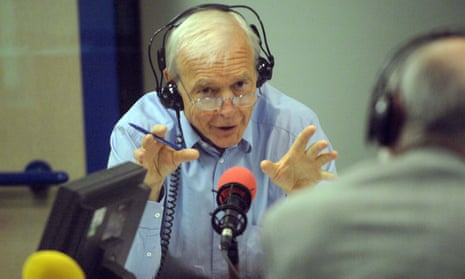There was a point during last week’s ritual savaging of BBC executives that one began to feel sorry for James Purnell. The former Labour minister who joined the BBC as head of digital and strategy in 2013 trailed around the studios of New Broadcasting House being gleefully mauled by journalists who are mercifully good at their jobs. Executive and star pay at the BBC is a subject loved by news producers, sadistically pitting the hated boss class and the vain talent against each other in an awkward series of explanations.
In his new role as head of radio and education, Purnell might have felt a strong impulse to clip the salary of Jeremy Vine who, in the most BBC of all BBC moments asked Purnell on his Radio 2 show: “How can you justify my salary?” Given that it is more than £700,000 a year, the honest answer would be “I can’t”, but Purnell opted for the lamer: “You’re fantastic.”
The dogmatic insistence that the BBC had to pay higher salaries or lose talent had been spiked by presenter John Humphrys on Radio 4’s Media Show, when he was asked if he would do his job for less money. “Of course, I would!” he said.
A low point for the valiant Purnell came during a 10-minute mauling by Radio 4 PM presenter Eddie Mair. In an attempt to lance the boil of the BBC’s gender pay gap, he found himself comparing Humphrys, who presents Today on Radio 4 and Mastermind on television, to a footballer: “The same as a left back and a right back in a football team, they [presenters] don’t get paid the same”. As an Arsenal fan, Purnell ought to know that left backs and right backs are often paid the same - until they go to Manchester City for double the wages.
And this is where the BBC’s annual salary flagellation reveals a key strategic challenge for BBC management. The BBC is a “selling club”, in football parlance. Its role is not to dominate viewing figures, though it has managed that in recent years. It is to lead the cultural life of the UK through electronic media; developing voices and perspectives that enrich and inform the national identity and conversation. At the risk of lapsing into platitude, this is a role rarely accomplished at the scale and for the period of time the BBC has held sway. If, however, the BBC continues to think of itself only in terms of market competition with commercial broadcasters, then it will fail.
Arguments about the necessity for the BBC to compete with entertainment and technology companies seem bogus to the public for good reason. Finding broadcasting talent is hard, but far from impossible. There are many more people who want to fill the coveted positions in front of camera than there are positions to fill.
Every year, there are footballers retiring who are articulate and able to share their passion for the sport, who do not require £400,000 a year to talk about the week’s matches. Some of them are women, even. In 2001, when Des Lynam defected from the BBC to ITV with Match of the Day, it was an opportunity to try out others. Among them was Gary Lineker, now one of the BBC’s highest paid presenters who, perhaps, should have been allowed to go when larger sums were offered by rivals.
The next turn of the media cycle is being driven, at pace, by platform companies. The financial threat they pose to traditional broadcasters is well known and only likely to increase in the foreseeable future. More worrying for broadcasters such as ITV and the BBC, the current institutional broadcasters, is the apparent creative freedom and risk-taking which this vast wealth allows. Going to Netflix or Amazon is not so much a sign of “selling out” for producers and performers, but trying something more adventurous than broadcast commissioning would allow.
The BBC can afford to lose established talent, but it cannot afford to lose its place as the engine of the British creative digital economy. This is where the management composition of the BBC, rather than its salary structure, needs closer attention.
With the sole exception of Charlotte Moore, the director of content, none of Tony Hall’s management board come from a programming background, none from a talent development background or, more surprisingly, from an entertainment background. The creative vision of the BBC was held for a long time - many thought too long - by the recently departed Alan Yentob. It is not at all clear that Hall’s BBC has a creative vision, at a moment when it sorely needs one. The board is configured to do a job which came to an end last year - renewal of the royal charter - replete as it is with strategic, marketing and political skills. It seems less well oriented towards the next task.
Casting the BBC as a market competitor to ITV, Amazon, Netflix, Apple and Sky is as pointless as viewing Cambridge University as a competitor to Google: whatever the crossover sets of skills and the competition between the two for talent, they remain fundamentally different organisations.
Netflix has a commissioning budget of more than £4bn a year ($6bn), placing it second only to ESPN, the international sports broadcaster. This is almost twice the size of the entire BBC budget. Amazon is raising its own budgets to compete with Netflix. But these are global businesses; they might one day fulfill a regional or local remit, but not yet.
The good news for the BBC is that in a sea of options and choice, there appears to be an increasing appetite for culturally specific news, information and entertainment which is not automatically provided by the market.
In the US, National Public Radio has faced defunding from Donald Trump’s administration and an ongoing existential battle to remain relevant against a vast and growing commercial media sector. NPR, although much smaller than the BBC, has seen its listenership grow rather than shrink.
There is an explosion in younger listeners discovering podcasts and audiences using new technologies – such as “smart speakers” – to consume more audio. A decade ago it seemed impossible to imagine that talk audio would be the hottest trend among the under-24 demographic. The BBC has been important to Britain over the past century by telling us surprising stories about ourselves and it has been at its worst when it has been confused or distracted from that mission by political or commercial forces.
The BBC’s power of invention will be stifled if it adheres too closely to its current market philosophy. The market is not fair or diverse. The market overpays men and underpays women. By following the market, the corporation ends up with the embarrassing gender pay gap its rivals exploited last week.
Every day since the BBC started its TV broadcasting in 1936, there has been more audio and visual opportunity available. More bandwidth, more slots, more minutes. Never once have broadcasters run out of people to appear on air. Miraculously, people continue to want to report the news, present programmes, write scripts or perform. And, across the broad sweep of audiovisual entertainment, the aggregate quality of output is far higher than before.
If the BBC is being plundered for skilled talent on a regular basis, then it is fulfilling its remit, both creatively and culturally. When it is holding on to safe bets for salaries which are offensively out of line with the income of the people who pay them, then it is failing. It is not a question of competition, it is a question of culture.

